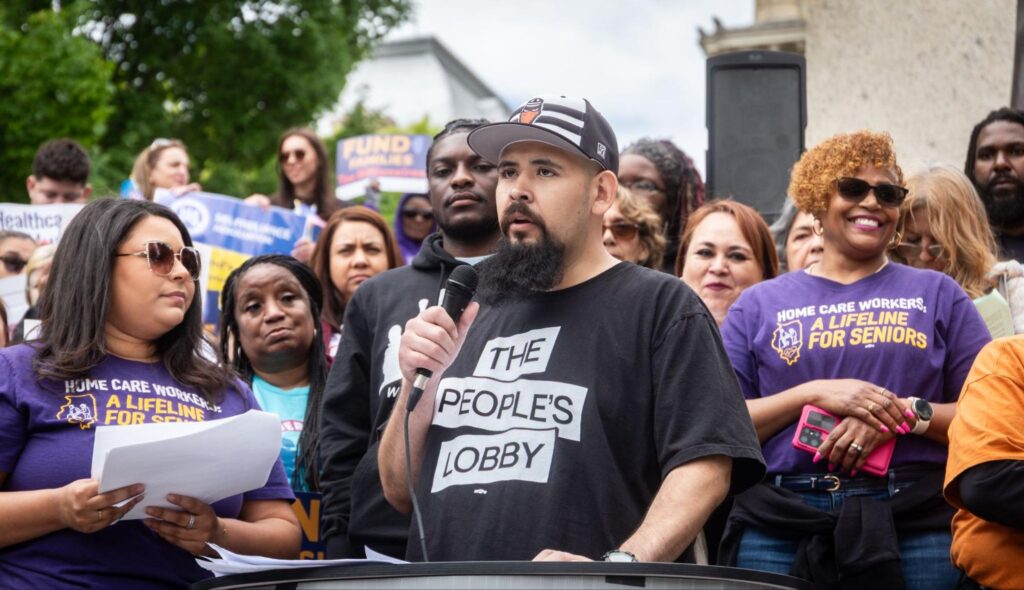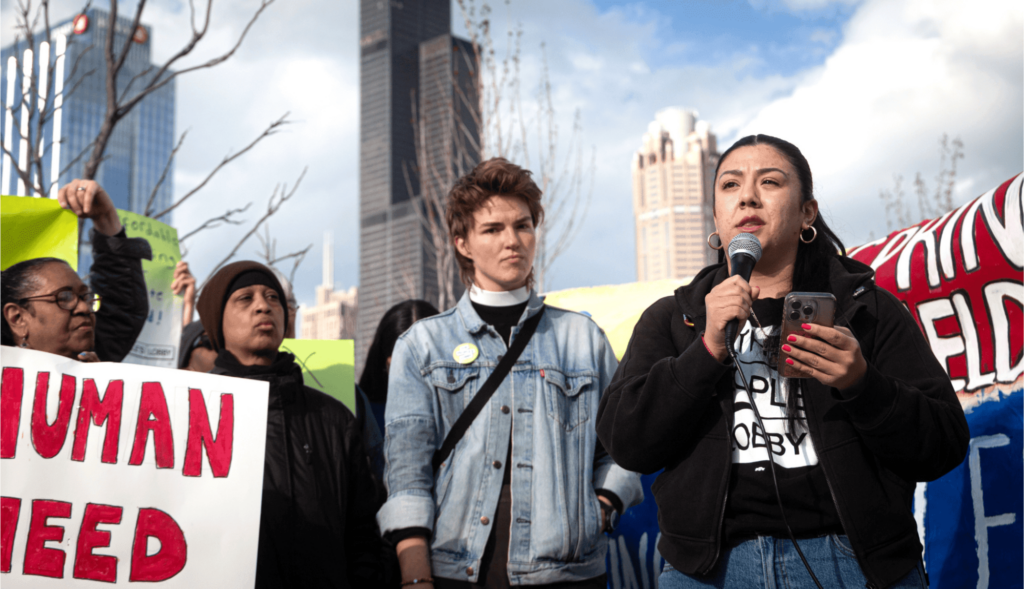On Friday, October 31, the Illinois General Assembly passed a bill that will transform the future of transit in the Chicago region. The Northern Illinois Transit Authority (NITA) Act raises $1.5 billion in new revenue, enough to both prevent the 40% cuts in transit service that had threatened the system as federal COVID-19 funding ran out, AND to significantly expand and improve transit service across the region. The bill also creates a new umbrella transit agency that will unify the previously disparate and uncoordinated fare systems, schedules, and planning of the three transit agencies (CTA, Metra, and Pace) so that transit riders have access to a reliable, seamless system not limited by the boundaries between city and suburbs. Collectively, these changes add up to the largest improvement in the region’s transit system in more than 40 years, helping millions of poor and working people get to jobs, health care, grocery stores, recreational and cultural activities, and all the other amenities that make the Chicago region great. In addition, these improvements will significantly decrease the climate impact of transportation in our region.
This story could easily have had a very different ending. Like many metropolitan transit systems across the country, the Chicago transit system was hit hard by the COVID-19 pandemic. This caused dramatic declines in ridership—and fare revenue—which outlasted the pandemic, because many people continued some level of remote work. In addition, the lack of both riders and drivers during the pandemic exacerbated reliability and safety issues, further discouraging ridership and threatening to spiral into a full-scale decline. Federal COVID relief funding filled budget holes for several years, but that stopgap was predicted to run out by the end of 2025, exacerbating the preexisting crisis and causing a projected budget shortfall of more than $700 million each year.
For decades, the Chicago region’s transit systems have faced two interconnected issues: how to reform a disjointed transit system that made it difficult for travelers to cross suburban borders and forced urban and suburban transit users to compete for funding, and how to expand funding for transit dramatically enough to enable the frequent, reliable service that people need to be able to depend on.
The People’s Lobby’s Environmental Justice Task Force began organizing on this issue in 2023. We set up in-person and virtual listening sessions with our members in the city and the suburbs to identify the most pressing environmental issues in their communities. Commuters couldn’t help but notice that transit service had sharply declined since COVID, especially in Black and brown and low-income neighborhoods that also have double the rate of households without cars. With the writing on the wall for transit funding when COVID money ran out, saving transit quickly rose to the top of our list of concerns. We joined a broader transit coalition effort with the Illinois Clean Jobs Coalition, Active Transportation Alliance, Metropolitan Planning Council, Sierra Club Illinois, and a number of other organizations.
But it wasn’t enough for our coalition to just restore transit to the way it had been before the pandemic: even before COVID, the lack of coordination between Metra, Pace, CTA, and RTA made it very difficult for commuters to get around efficiently, and Black, brown, and poor areas of the city and suburbs were underserved. Both riders and drivers felt unsafe on the system, and riders with disabilities faced extra barriers to access much-needed paratransit services. Our members were clear on our goals: we would use this moment of crisis to reimagine our transit system by consolidating the region’s four transit agencies and adding enough revenue—$1.5 billion—to avoid cuts and expand service.
Starting in the summer of 2024, TPL launched a series of ten town hall meetings in six areas of Chicago and the suburbs, which gave people the opportunity to share with state legislators their hopes and concerns about the future of the transit system and showed legislators in a diverse array of communities that their voters were demanding both reform and resources to transform our transit system. These events drew more than 700 people and were covered by media that reached tens of thousands more.
Bruno Garcia, a People’s Lobby leader in the west suburbs, spoke at a press conference in Springfield about the ways transit access impacts low-income people in the region:

“I used to live in Aurora. Despite being the second-largest city in Illinois, the people who live there can’t rely on Aurora’s underfunded public transit system to get them to work. This made it hard for me to hold a job, get to the doctor, and just move around in general. Getting caught in the rain with an armload of groceries because my bus got cancelled was bad enough, but the fact that I couldn’t take a second-shift job because Aurora didn’t have a bus any later than 7:10 p.m. threatened my ability to feed myself. Now I’m back in Romeoville, where I grew up, and where public transportation is almost nonexistent. I’ve been in recovery for more than a year, but my legal situation still limits my employment opportunities, which makes it even more frustrating to have to limit my job search to areas that happen to be covered by our inadequate transit.”
Lina Avalos, a People’s Lobby Education Institute board member and Southeast Side resident, shared her experiences at a variety of lobby days and in-district meetings:
“While attending school in the West Loop, I faced nearly two-hour train commutes each way. I’d wake up at 5 a.m. just to get to class, while friends in better-connected neighborhoods could roll out of bed hours later. I didn’t have the words to explain why at the time, but I knew something was deeply wrong. That’s when I discovered The People’s Lobby and learned about environmental justice—a term coined by South Side organizer Hazel Johnson as she fought the industrial pollution and city negligence that disproportionately harm Black, brown, and low-income communities like mine. Environmental justice isn’t just about clean air and water. It’s about public transit being funded so everyone, everywhere, regardless of income, can catch a bus or train to reach where they need to go.”

We shared these stories with dozens of legislators to illustrate the need not only to protect transit from cuts but also to expand and improve transit service so it can better enable equitable access for every resident of the Chicago region. We organized seven lobby days, bringing more than 300 people to Springfield between November 2024 and October 2025; sent hundreds of letters to legislators; filled out hundreds of witness slips; and had members tell their transit stories to reporters and at several public actions alongside our coalition partners.
Finally, late at night at the very end of the October veto session, the General Assembly passed the Northern Illinois Transit Authority (NITA) Act, consolidating key elements of the RTA, CTA, Metra, and Pace, making the $1.5 billion investment that we needed to build and expand a truly world-class transit system that will serve poor and working people into the future, and striking a blow against climate change by providing a reliable alternative to driving a personal vehicle for every trip. This was a win for the Illinois Clean Jobs Coalition (of which TPL is a member), Active Transportation Alliance, and a number of other organizations, and The People’s Lobby’s organizing played a significant role in getting this over the finish line.
We were particularly focused on shaping how this bill is funded, pushing legislators to divert a significant amount of money that would otherwise go toward roads and highways to public transportation, rather than relying largely on more regressive revenue sources. TPL’s leadership in this campaign was recognized by the transit bill sponsors, including TPL leader Angie Khio, who spoke at the legislators’ press conference on November 4, announcing and celebrating the bill’s passage.
This bill is the largest reorganization of the system since 1983 and the most significant increase in funding in the history of all of the Chicago-area transit agencies. The combined budgets of all the agencies in 2025 add up to $4.2 billion (including $817 million in expiring federal COVID relief funds), so $1.5 billion annually in additional operating funding in the years to come constitutes a massive increase in resources for public transportation in our region. It will prevent a 40% cut in transit service that had been planned for the scenario in which no new revenue was added, and it will enable a variety of improvements including an integrated fare system and schedule that riders can use for all three branches of the transit system; unarmed “transit ambassadors” to improve safety; the conversion of the current fleet of buses from gas to electric; and “bus rapid transit” that uses dedicated bus lanes and pre-boarding fare collection to make buses much faster and more reliable, just to name a few. These investments will enable millions of people in low-income and BIPOC communities to have better access to the necessities they need to survive, as well as recreational and cultural activities that allow them to thrive. This campaign shows that low-income communities organizing for environmental justice can win real improvements in people’s lives while dramatically reducing the region’s carbon footprint.
